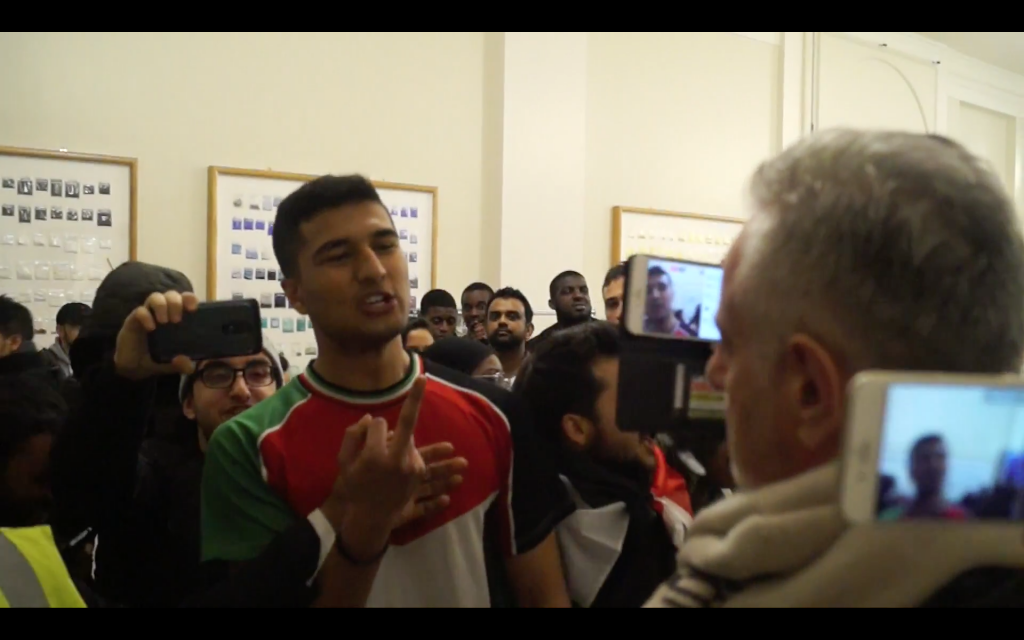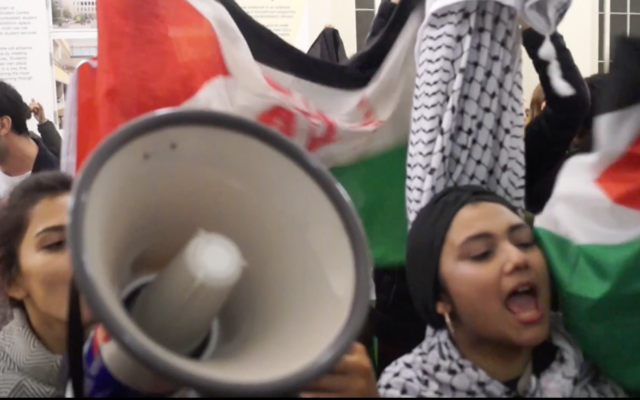Students to face disciplinary panel over UCL anti-Israel protest
A number of people will be probed after demonstrations against an Israeli speaker on a London campus turned violent last October
A number of students at University College London (UCL) are to face a disciplinary panel after a confrontation on campus last October, when a former Israeli soldier flew in to speak to pro-Israel students.
However, a report into the event has also showed that the clash could have been avoided altogether had University bosses not over-ruled two prior decisions by the Student Union not to hold the event on security grounds.
UCL President and Provost Michael Arthur and Vice Provost Rex Knight gave the go-ahead for ex-IDF soldier-turned-activist Hen Mazzig to speak at the prestigious London campus despite the Union having twice ruled that it would be inappropriate.
The circumstances leading up to the Friends of Israel Society event were outlined in a report published this week, following an internal investigation by Professor Geraint Rees, Dean of the UCL Faculty of Life Sciences.
Rees said that, in its application to the Union, the Society had “stated that security was not required, that the function would not attract media interest and that in the past, the speaker and topic have not generated any controversy”.
The University’s Security team grew concerned, however, after the Society began advertising the event. The Union then discovered that Mazzig had also spoken at an event at King’s College, London, in 2014, which had attracted confrontation.
The Union rejected the Society’s application, on the grounds of “failure to disclose full information on the speaker”. An appeal was also rejected, on the grounds of no new evidence being presented.
However, UK Lawyers for Israel (UKLFI) advised the Friends of Israel Society, led by Liora Cadranel, to apply directly to the UCL President, who overturned the Union’s decision and gave the green light, pending a risk assessment.
The event went ahead and attracted protests from pro-Palestinian student groups, leading to scenes of confrontation, and students climbing through windows to get to the event venue. Several pro-Israel students later said they were “physically abused”, by protesters. The fracas was captured on film.
Rees says anger over Arthur and Knight’s was shared online among pro-Palestinian students, who booked a room in the same building to gain access ahead of Mazzig’s talk, despite the Friends of Palestine Society deciding not to organise a protest.
Having seen video footage and taken witness statements of subsequent events, investigators concluded that both pro-Israel and pro-Palestinian students were being antagonistic outside.
“There was a hostile and tense atmosphere, with verbal hostility and flag-waving from both groups,” wrote Rees. “There was some pushing and shoving on entry to the room but no physical violence or damage to property… Both protestors and counter-protesters in the G03 lecture theatre were verbally hostile and occasionally verbally abusive towards each other.”

However, as Security dispersed the event, students moved to another location – the Haldane Room – where they were followed by pro-Palestinian demonstrators, who then “created a verbally intimidating atmosphere by shouting, chanting and banging on the window and door, augmented by amplified loudspeakers,” said Rees.
One pro-Israel activist was captured on video behaving in a manner than “could be interpreted” as being aggressive towards Islam and is understood to have been identified by Rees as engaging in “physically aggressive behaviour”. Rees’s report records these actions as “unacceptable” and “Islamophobic”.
Rees said three protesters (two of whom are UCL undergraduates) then climbed in through an open window, lying on the floor of the Haldane Room. One unnamed attendee is recorded as being “verbally hostile to the protesters, stamping her foot in the vicinity of one as he lay on the floor”. Minutes later, the protesters were removed.

When the police arrived, UCL Security decided against asking officers to forcibly disperse protesters “as at that time no serious violence or property damage was evident,” although the “noisy demonstration and banging on windows continued intermittently”.
While most of the chanting was acceptable, Rees took issue with those singing: “From the river to the sea, Palestine will be free.” He said this “appears to be calling for the destruction of Israel” and “could be considered anti-Semitic”.
Rees said that while complaints of “assault” from attendees were either withdrawn or unsubstantiated, the protesters nevertheless created a “highly disruptive and intimidatory” atmosphere, and advised that disciplinary action be considered for some students, whose names were redacted.
In summation, Rees said that although there was no serious violence, the demonstration represented “a sustained attempt to prevent free speech on campus within the law that went beyond a legitimate vigorous protest”.

Thank you for helping to make Jewish News the leading source of news and opinion for the UK Jewish community. Today we're asking for your invaluable help to continue putting our community first in everything we do.
For as little as £5 a month you can help sustain the vital work we do in celebrating and standing up for Jewish life in Britain.
Jewish News holds our community together and keeps us connected. Like a synagogue, it’s where people turn to feel part of something bigger. It also proudly shows the rest of Britain the vibrancy and rich culture of modern Jewish life.
You can make a quick and easy one-off or monthly contribution of £5, £10, £20 or any other sum you’re comfortable with.
100% of your donation will help us continue celebrating our community, in all its dynamic diversity...
Engaging
Being a community platform means so much more than producing a newspaper and website. One of our proudest roles is media partnering with our invaluable charities to amplify the outstanding work they do to help us all.
Celebrating
There’s no shortage of oys in the world but Jewish News takes every opportunity to celebrate the joys too, through projects like Night of Heroes, 40 Under 40 and other compelling countdowns that make the community kvell with pride.
Pioneering
In the first collaboration between media outlets from different faiths, Jewish News worked with British Muslim TV and Church Times to produce a list of young activists leading the way on interfaith understanding.
Campaigning
Royal Mail issued a stamp honouring Holocaust hero Sir Nicholas Winton after a Jewish News campaign attracted more than 100,000 backers. Jewish Newsalso produces special editions of the paper highlighting pressing issues including mental health and Holocaust remembrance.
Easy access
In an age when news is readily accessible, Jewish News provides high-quality content free online and offline, removing any financial barriers to connecting people.
Voice of our community to wider society
The Jewish News team regularly appears on TV, radio and on the pages of the national press to comment on stories about the Jewish community. Easy access to the paper on the streets of London also means Jewish News provides an invaluable window into the community for the country at large.
We hope you agree all this is worth preserving.






















